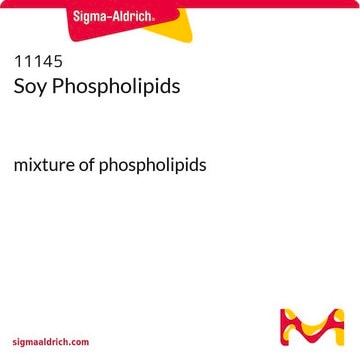429415
L-α-Lecithin
≥97% (choline basis), solid, lipotropic agent, Calbiochem
Synonym(s):
L-α-Lecithin, Soybean
About This Item
Recommended Products
product name
L-α-Lecithin, Soybean, L-α-Lecithin, Soybean, CAS 8002-43-5, is a concentrate of soybean lecithin consisting of more than 94% phosphatidylcholine and less than 2% triglycerides.
Quality Level
form
solid
manufacturer/tradename
Calbiochem®
storage condition
OK to freeze
color
light yellow
solubility
RPMI culture medium: 10 mg/mL, turbid
chloroform: 200 mg/mL
shipped in
wet ice
storage temp.
−20°C
General description
Application
Biochem/physiol Actions
Packaging
Warning
Reconstitution
Legal Information
Storage Class
11 - Combustible Solids
wgk_germany
WGK 1
flash_point_f
Not applicable
flash_point_c
Not applicable
Certificates of Analysis (COA)
Search for Certificates of Analysis (COA) by entering the products Lot/Batch Number. Lot and Batch Numbers can be found on a product’s label following the words ‘Lot’ or ‘Batch’.
Already Own This Product?
Find documentation for the products that you have recently purchased in the Document Library.
Customers Also Viewed
Articles
Learn more about our culture media portfolio for microbial examination of non-sterile products, fully compliant with the harmonized Pharmacopoeia.
Our team of scientists has experience in all areas of research including Life Science, Material Science, Chemical Synthesis, Chromatography, Analytical and many others.
Contact Technical Service




